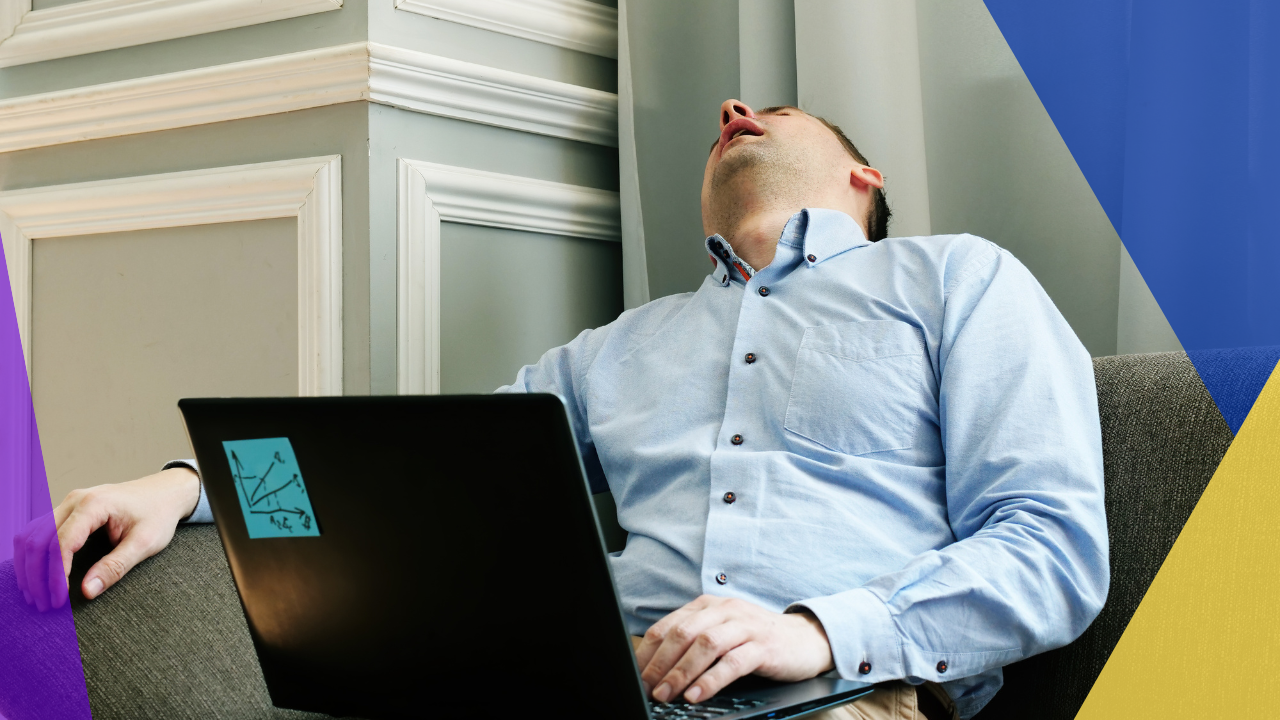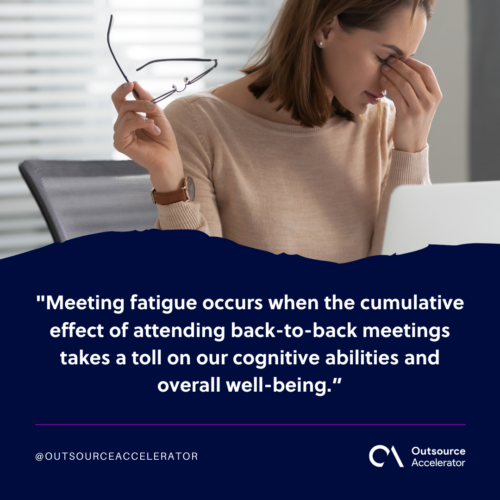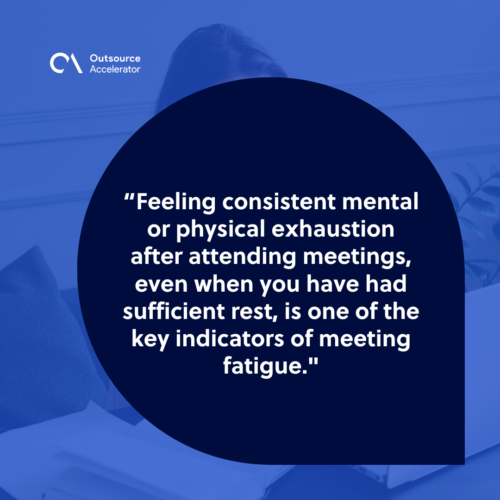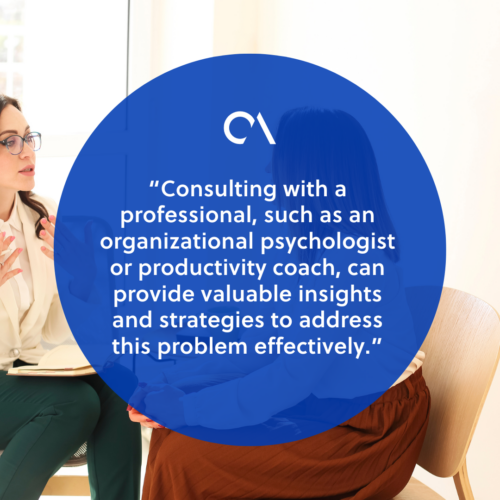Meeting fatigue: Causes and prevention tips

Meetings have become integral to our professional lives, whether in-person or online.
However, attending countless meetings can often lead to a state of exhaustion and decreased productivity. Zippia’s study shows that 45% of employees feel overwhelmed with too many meetings they experience.
Overpouring meetings can even result in meeting fatigue within teams. Fortunately, there is a way to combat this condition within your staff.
This article will explore the causes of meeting fatigue and provide actionable tips to prevent and combat it.
What is meeting fatigue?
Meeting fatigue refers to the mental and physical exhaustion individuals experience from attending numerous meetings.
It occurs when the cumulative effect of attending back-to-back meetings takes a toll on our cognitive abilities and overall well-being.
The constant exposure to information overload and prolonged periods of sitting can contribute to this state of fatigue.
While teams can experience meeting fatigue during in-person gatherings, it is more commonly attached to virtual meetings. This is why it is also called “Zoom fatigue.”

Causes of meeting fatigue
Meeting fatigue is caused by various factors tied up with constant meetings, such as the following:
Overstimulation
One of the primary causes of meeting fatigue is overstimulation. Meeting participants are bombarded with details, ideas, and decisions in each meeting.
The constant influx of information, presentations, and discussions can overwhelm our brains, leading to mental exhaustion.
Communication issues
Communication issues can significantly contribute to meeting fatigue.
Poorly organized or inefficiently conducted meetings can result in unclear instructions, miscommunication, and excessive time spent on irrelevant topics.
When communication falls short, it can lead to frustration and increased mental effort. These factors can make participants feel drained.
Physical stress
Sitting for extended periods in meetings can take a toll on our physical well-being. Prolonged sitting can cause muscle tension, reduced blood circulation, and discomfort.
Physical discomfort can exacerbate mental fatigue, making staying engaged and focused during meetings difficult.
Warning signs of meeting fatigue
To effectively combat meeting fatigue, it’s crucial to recognize the warning signs. By identifying these signs early on, you can take proactive steps to prevent the onset of fatigue.
Here are some common warning signs of meeting fatigue:
Exhaustion
Feeling consistent mental or physical exhaustion after attending meetings, even when you have had sufficient rest, is one of the key indicators of meeting fatigue.
If you notice a significant drop in energy levels post-meeting, it’s essential to pay attention to this warning sign is essential.

Headaches
Frequent headaches during or after meetings can be an indication of meeting fatigue. As the brain becomes overloaded with information and the stress of continuous focus, it can manifest as headaches or migraines.
Irritability
Meeting fatigue can also manifest as increased irritability and frustration. If you find yourself easily annoyed or impatient during meetings, it could be a sign that you are experiencing fatigue.
Absentmindedness
Struggling to concentrate and experiencing frequent lapses in attention during meetings may be a sign of meeting fatigue.
Staying fully engaged and absorbing information becomes difficult when your mind wanders or loses focus. This is worsened when you tend to multitask during meetings.
Depression
Long-term exposure to meeting fatigue can have an impact on mental health, leading to feelings of depression or disillusionment.
Addressing these emotions is essential if you consistently experience a sense of dread or lack of motivation when attending meetings.
How to prevent meeting fatigue
Fortunately, there are several strategies you can implement to prevent meeting fatigue and make your meeting experiences more productive and energizing.
Limit your meeting length
One of the most effective ways to combat meeting fatigue is to limit the length of your meetings.
Consider shorter, focused meetings rather than unnecessarily extending them. Always set a meeting agenda to organize your discussion points and thoughts throughout the meeting.
You can ensure that discussions remain concise and relevant by putting time limits in your meetings.
Be as interactive as possible
Encouraging active participation and interaction during meetings can help to combat meeting fatigue.
Foster an environment where everyone feels comfortable sharing their ideas and opinions. Engaging in discussions and collaboration keeps participants involved and reduces the likelihood of fatigue.
Take breaks
Building in regular breaks during longer meetings can help alleviate some of the physical and mental strain that contributes to meeting fatigue.
These breaks allow participants to stretch, move around, and recharge, improving overall focus and engagement.
Encourage routine creation
Establishing routine and structure around meetings can significantly reduce meeting fatigue.
Creating standardized agendas, clear meeting objectives, and designated roles can streamline the meeting process and minimize unnecessary stress and confusion.
Seek help if needed
If meeting fatigue becomes a chronic issue for you or your team, consider seeking assistance.
Consulting with a professional, such as an organizational psychologist or productivity coach, can provide valuable insights and strategies to address this problem effectively.

Combatting meeting fatigue
Meeting fatigue is a common challenge in today’s work environment. However, we can overcome this fatigue by understanding the causes and implementing preventive measures.
You can transform your meeting experiences into energizing and productive sessions with little effort and attention.
Implementing the prevention tips above can effectively combat fatigue and improve your meetings’ productivity and engagement. Remember, it’s essential to be mindful of the signs of fatigue and proactively take steps to prevent its debilitating effects.
Let’s strive for productive and rejuvenating meetings to maximize our valuable time.







 Independent
Independent




